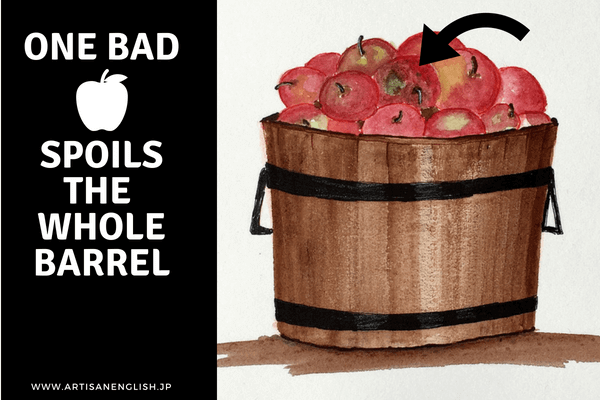
YouTube / iTunes / Spotify / Radio Public / Pocket Casts / Google Podcasts / Breaker / Overcast
Listen to ArtisanEnglish.jp posts & lesson intros here.
Proverb: One bad apple spoils the whole barrel
At a party, one bad apple spoils the whole barrel.
Imagine that you’re having a little dinner party with some old friends.
Everything is going great.
The food is fantastic, and the conversation is engaging.
Then you suddenly realize that one of your friends has had too many drinks and is starting to become obnoxious.
You do your best to calm them down and convince them to go home early, but that’s it; the party’s ruined.
The mood is spoiled, and everyone goes home.
Or how about this situation?
A bunch of people are working on a new startup.
Yes, it’s hard, and yes, everyone is working long hours, but everyone has a dream for the new company and wants to see that new company grow and flourish.
Then, just one person starts to complain constantly about the hard work, long hours, and low pay.
Soon, everyone is complaining and second-guessing themselves.
What was once a team working towards a common goal is now many individuals with nothing in common.
It only takes one bad apple to spoil the whole barrel.
As you can see, one bad apple spoils the whole barrel, means that it only takes one person with a bad attitude or one bad thing to spoil everything.
Things usually go that way for some reason.
I suppose we can call it Murphy’s Law – if something goes wrong, it usually will.
All we can do is weed out all the bad apples before they can cause any trouble.
I’ll go back to a proverb that seems to be popping up recently: an ounce of prevention is worth a pound of cure.
This proverb can be the antidote to one bad apple spoiling the whole barrel.
Flesch-Kincaid Readability Test
This post is understandable by someone with at least a 7th-grade education (age 12).
On the Flesch-Kincaid reading-ease test, this post scores 75.
The easier a passage is to read, the higher the score on a scale of 0 – 100.

